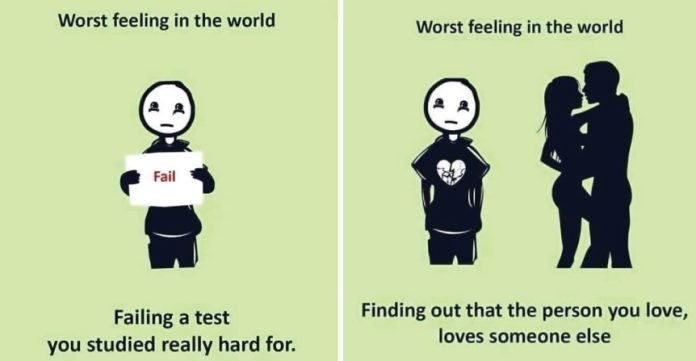When Emotions Break: The Silent Pain of Loneliness and Other Heart-Wrenching Feelings We All Face
Explore the silent pain of loneliness and other devastating emotions we all experience. Learn how to cope with heartbreak, betrayal, and grief in healthy ways.
Have you ever felt like your heart was literally breaking? That crushing sensation in your chest when life hits you with its most devastating blows? You’re not alone. Every human being will experience heart-wrenching emotions that feel like they might destroy us from the inside out. Among these painful feelings, loneliness stands as one of the most silent yet devastating emotions we face, often hiding behind smiles and busy schedules while eating away at our souls.
#01
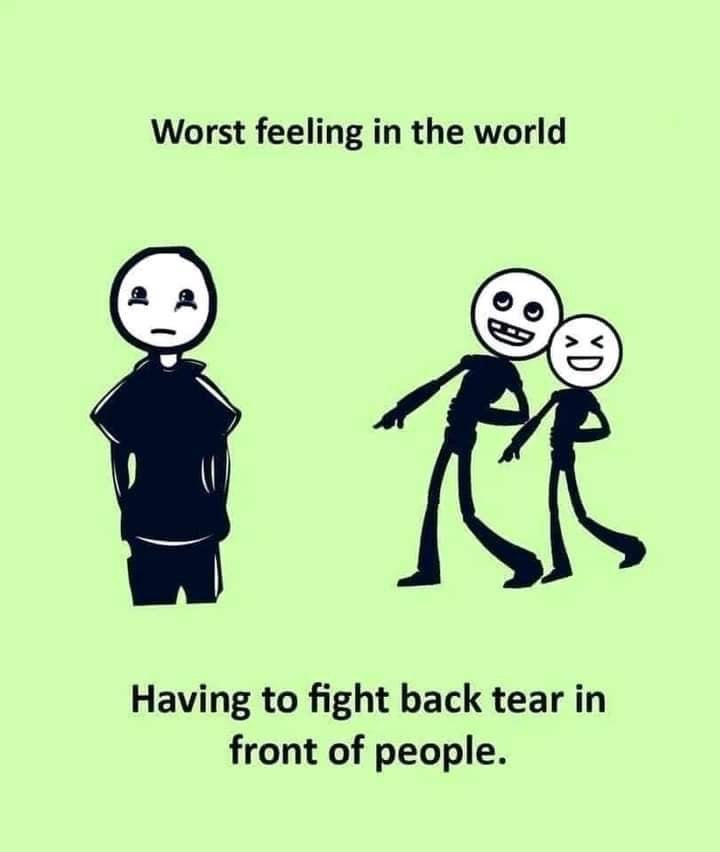
Life isn’t just about the happy moments we share on social media. It’s also about those dark valleys where we face emotions so intense they leave us gasping for air. Today, we’re diving deep into the silent pain of loneliness and other crushing feelings humans experience – not to make you sad, but to help you understand that these emotions are part of our shared human experience.
#02

Understanding the Depths of Human Emotion
What Makes Some Feelings More Painful Than Others?
Not all emotions are created equal. While feeling annoyed at traffic is unpleasant, it doesn’t compare to the soul-crushing pain of losing someone you love. The most painful emotions share common characteristics: they involve loss, betrayal of trust, or the shattering of our core beliefs about ourselves and the world.
These intense feelings often catch us off guard. One moment we’re living our normal lives, and the next, we’re drowning in an ocean of pain that seems impossible to escape. The depth of our pain often reflects the depth of what we’ve lost – whether it’s a person, a dream, or our sense of security.
#03

The Science Behind Emotional Pain
Here’s something fascinating: your brain processes emotional pain in the same regions that handle physical pain. When scientists study people experiencing heartbreak or grief, brain scans show activity in the anterior cingulate cortex and right ventral prefrontal cortex – the same areas that light up when you stub your toe or burn your hand.
This isn’t just poetic language when we say our heart is “broken.” Your brain literally interprets emotional pain as physical injury. That’s why heartbreak can make you feel nauseated, give you headaches, or even cause chest pain. Your body is responding to real trauma, even though no physical wound exists.
#04

The Crushing Weight of Grief and Loss
Losing a Loved One: The Ultimate Heartbreak
Nothing prepares you for the moment you realize someone you love is gone forever. Grief isn’t just sadness – it’s a complete reorganization of your world. Every shared memory becomes precious and painful. Every future plan crumbles. The person who made your world brighter is no longer there to share it with.
#05
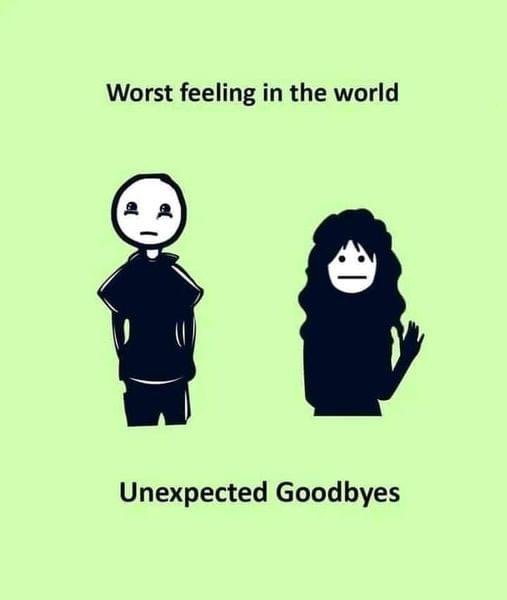
Grief hits everyone differently. Some people feel numb, like they’re moving through life in a fog. Others feel overwhelmed by waves of emotion that come without warning. You might find yourself angry at the person who died, then guilty for feeling angry. You might search for them in crowds or reach for your phone to call them before remembering they won’t answer.
The hardest part? Grief doesn’t follow a timeline. Society might expect you to “move on” after a few months, but grief is a lifelong journey. You don’t “get over” losing someone important – you learn to carry the loss with you while still finding reasons to smile.
#06
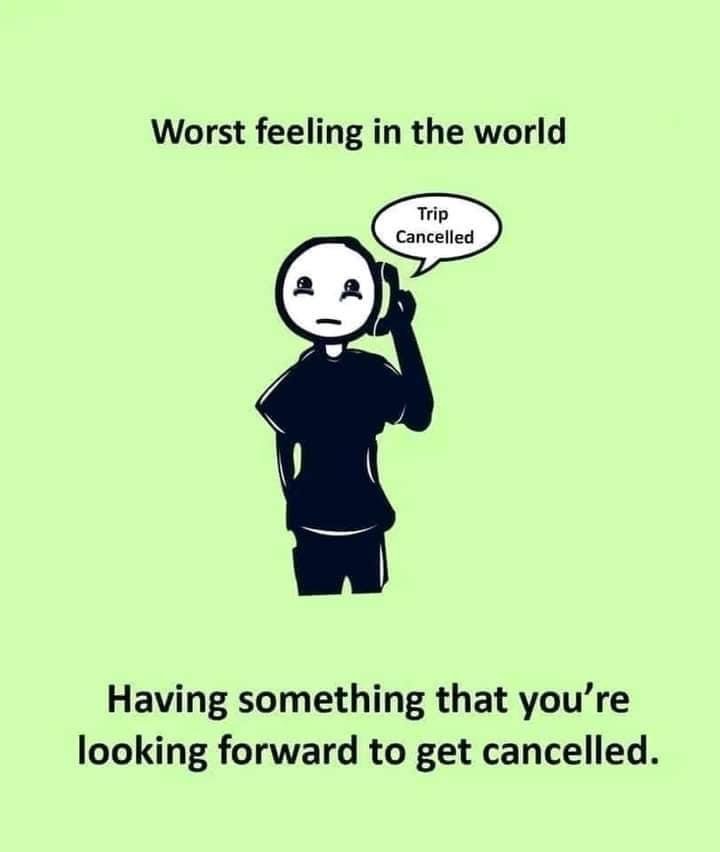
Different Types of Grief We Experience
Anticipatory Grief
Sometimes the pain starts before the loss occurs. When someone you love is dying from a long illness, you begin grieving while they’re still alive. This anticipatory grief can feel confusing – you’re mourning someone who’s still with you, preparing for a loss that hasn’t happened yet.
Complicated Grief
For some people, grief becomes stuck. Instead of gradually learning to function with their loss, they remain trapped in the acute phase of mourning. Complicated grief can last for years, interfering with daily life and preventing emotional healing.
#07
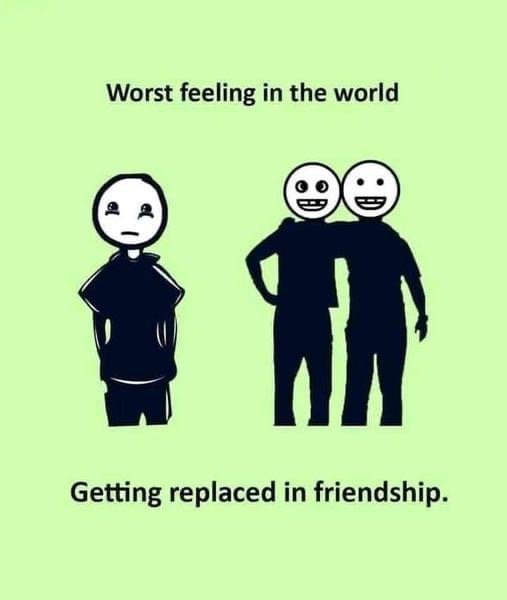
Betrayal: When Trust Shatters Into a Million Pieces
The Anatomy of Betrayal
Betrayal is unique among painful emotions because it involves two losses at once: you lose the person you trusted, and you lose your faith in your ability to judge character. When someone betrays you, they don’t just hurt you – they make you question everything you thought you knew about them and about yourself.
The shock of betrayal often paralyzes us initially. Your mind races, trying to make sense of what happened. How could someone you trusted do this to you? Were there signs you missed? How could you have been so wrong about them?
Why Betrayal Hurts More Than Physical Pain
Betrayal activates the same brain regions as physical pain, but it also triggers our deepest fears about abandonment and rejection. When someone betrays us, our brain interprets it as a threat to our survival – because for our ancestors, being rejected by the group could mean death.
This is why betrayal often leads to obsessive thoughts. Your brain keeps replaying the betrayal, searching for clues you missed and trying to prevent future betrayals. Unfortunately, this mental replaying often keeps the wound fresh instead of helping it heal.
Romantic Betrayal and Infidelity
Discovering that your romantic partner has been unfaithful feels like having your world turned upside down. The person who was supposed to be your safe harbor becomes the source of your greatest pain. Every shared moment becomes questionable. Every “I love you” becomes suspect.
Infidelity doesn’t just destroy trust in your partner – it can destroy trust in yourself. You might wonder if you’ll ever be able to trust anyone again, or if you’re somehow unworthy of faithful love.
#08

Friendship Betrayal
When a close friend betrays you, it can be just as devastating as romantic betrayal. Friends are the people we choose to let into our lives, which makes their betrayal feel like a rejection of who we are as people. Friend betrayal often involves gossiping, breaking confidences, or choosing sides in conflicts.
The Agony of Unrequited Love
When Your Heart Loves Someone Who Doesn’t Love You Back
Loving someone who doesn’t love you back is like being hungry while staring at food you can never eat. You can see exactly what you want, but it remains forever out of reach. Every interaction with them becomes both a gift and a torture.
Unrequited love often involves a cruel cycle of hope and disappointment. You read too much into their friendly gestures, then crash when you realize they were just being kind. You might spend hours analyzing their words, looking for hidden meanings that probably aren’t there.
The Psychological Impact of One-Sided Love
Unrequited love can damage your self-esteem in profound ways. You might start to believe there’s something wrong with you – that you’re not attractive enough, interesting enough, or worthy enough of love. This self-doubt can follow you into future relationships, creating a pattern of insecurity and fear.
The rejection inherent in unrequited love activates the same brain regions as physical pain. Your brain literally processes being unloved as an injury, which explains why it hurts so much to love someone who doesn’t love you back.
Profound Disappointment: When Dreams Crumble
Career Failures and Shattered Ambitions
We all have dreams that give our lives meaning and direction. When those dreams are crushed – whether by our own failures or circumstances beyond our control – the disappointment can be overwhelming. You might feel like you’ve wasted years of your life pursuing something that was never going to happen.
Career disappointments are particularly painful because they often represent more than just job setbacks. They can feel like failures of our entire identity. If you’ve always seen yourself as destined for success in a particular field, career failure can leave you wondering who you really are.
Failed Relationships and Broken Promises
When relationships end, especially long-term ones, you don’t just lose your partner – you lose all the future plans you made together. The house you were going to buy, the children you were going to have, the retirement you were going to share – all of it vanishes in an instant.
The Role of Expectations in Disappointment
The bigger our expectations, the harder we fall when they’re not met. This doesn’t mean we should stop having hopes and dreams, but it explains why some disappointments hurt more than others. When we invest years of emotional energy into an outcome that doesn’t happen, the pain can be devastating.
Loneliness: The Silent Epidemic of Our Time
Why Loneliness Feels Like Physical Pain
Loneliness might be the most misunderstood emotion we experience. It’s not just about being alone – it’s about feeling disconnected from others even when you’re in a crowd. This silent pain affects millions of people worldwide, yet we rarely talk about it openly because admitting loneliness feels like admitting failure in our hyper-connected world.
Modern research shows that chronic loneliness is as harmful to your health as smoking 15 cigarettes a day. It increases your risk of depression, anxiety, heart disease, and even early death. The pain of loneliness exists because humans are social creatures. For thousands of years, being alone meant being vulnerable to predators and unable to find food or shelter. Your brain still interprets chronic loneliness as a threat to your survival, which is why it hurts so much.
Social Isolation vs. Emotional Loneliness
You can be surrounded by people and still feel lonely if you don’t have meaningful connections. Emotional loneliness happens when you feel like no one really knows or understands you. You might have plenty of casual acquaintances but no one you can truly be yourself with.
Social media has paradoxically made loneliness worse for many people. We see everyone else’s highlight reels and assume they have better relationships than we do. We mistake online connections for real intimacy, leaving us feeling more isolated than ever. The irony is that while we’re more “connected” than ever before, genuine human connection seems harder to find.
Regret: The Weight of What Could Have Been
Living with Life’s Biggest Regrets
Regret is the emotion we feel when we believe our current situation would be better if we had made different choices in the past. The most painful regrets often involve things we didn’t do rather than things we did. The job we didn’t apply for, the person we didn’t tell we loved them, the risks we didn’t take.
What makes regret so torturous is that it involves endless mental replaying of past decisions. Your mind creates alternative scenarios where you made different choices, and you torture yourself with images of how much better your life could have been.
The Difference Between Regret and Remorse
Regret focuses on outcomes – we regret choices that led to bad results. Remorse focuses on actions – we feel remorseful when we’ve done something morally wrong. Both are painful, but regret tends to be more persistent because it involves imagining alternative realities.
The healthiest approach to regret involves accepting that you made the best decision you could with the information you had at the time. Hindsight is always 20/20, but you can’t judge past decisions with present knowledge.
How These Emotions Affect Our Mental and Physical Health
The Mind-Body Connection in Emotional Pain
Intense emotional pain doesn’t just hurt your feelings – it affects your entire body. Chronic stress from emotional trauma can weaken your immune system, disrupt your sleep, affect your appetite, and even change your brain structure. The phrase “dying of a broken heart” isn’t just poetic – severe emotional stress can actually trigger heart problems.
Depression and anxiety often follow intense emotional pain. Your brain’s chemistry changes in response to trauma, making it harder to feel pleasure or hope. This is why professional help is sometimes necessary – you’re not weak for needing support during these times.
Long-term Effects of Emotional Trauma
Unprocessed emotional pain can affect you for years or even decades. People who experience severe emotional trauma may develop post-traumatic stress disorder (PTSD), chronic depression, or anxiety disorders. They might struggle with trust in future relationships or have difficulty believing they deserve happiness.
However, it’s important to remember that healing is possible. The human brain is remarkably adaptable, and with proper support and treatment, people can recover from even the most devastating emotional experiences.
Coping Strategies for Heart-Wrenching Emotions
Healthy Ways to Process Pain
The first step in healing from emotional pain is accepting that it’s normal and necessary. Trying to avoid or suppress intense emotions usually makes them stronger and last longer. Instead, allow yourself to feel the pain while taking care of your basic needs.
Physical exercise can be incredibly helpful for processing emotional pain. When you exercise, your body releases endorphins that naturally improve your mood. Even a short walk can help when you’re overwhelmed by difficult emotions.
Talking to trusted friends or family members can provide relief and perspective. Sometimes just having someone listen and validate your feelings can make a huge difference. Don’t be afraid to reach out – most people want to help but don’t know how unless you tell them what you need.
Journaling is another powerful tool for processing emotions. Writing about your feelings can help you understand them better and track your healing progress over time. You don’t need to be a good writer – just let your thoughts flow onto paper.
When to Seek Professional Help
If emotional pain is interfering with your ability to work, maintain relationships, or take care of yourself, it may be time to seek professional help. Therapists are trained to help people navigate intense emotions and develop healthy coping strategies.
Don’t wait until you’re in crisis to reach out for help. Early intervention can prevent emotional pain from becoming chronic or developing into more serious mental health conditions.
Finding Hope and Healing After Heartbreak
The Journey to Emotional Recovery
Healing from intense emotional pain is not a linear process. You might feel better for a few days, then suddenly feel worse again. This is completely normal – healing happens in waves, not straight lines. Be patient with yourself and remember that setbacks don’t mean you’re not making progress.
Recovery often involves rebuilding your sense of identity and purpose. After major emotional trauma, you might feel like you don’t know who you are anymore. This is an opportunity to consciously choose who you want to become moving forward.
Building Resilience for Future Challenges
While we can’t prevent all emotional pain, we can build resilience to help us cope better when difficult times come. Resilience isn’t about being tough or never feeling pain – it’s about developing the skills and support systems that help you bounce back from adversity.
Building strong relationships, maintaining your physical health, practicing gratitude, and developing a sense of purpose can all increase your resilience. These aren’t just feel-good suggestions – they’re evidence-based strategies that actually change how your brain responds to stress and trauma.
Conclusion
Life will break your heart, and loneliness will whisper lies about your worth. That’s not pessimism – it’s reality. Every human being will experience profound emotional pain at some point in their lives. The silent agony of loneliness, the death of loved ones, betrayal by people we trust, shattered dreams, unrequited love, crushing disappointment, and haunting regret are all part of the human experience.
But here’s what’s truly remarkable about human beings: we survive these experiences. We find ways to keep going even when it feels impossible. We learn to carry our pain while still finding reasons to smile, love, and hope. The silent sufferer sitting next to you on the bus might be fighting the same battles you are.
Your pain is real and valid, but it’s not permanent. The intensity of emotional anguish does fade with time, even loneliness that feels endless. Those scars become part of your story – evidence of what you’ve survived and how strong you really are.
If you’re currently experiencing heart-wrenching emotions, especially the silent pain of loneliness, please remember that you’re not alone in feeling alone. Millions of people have felt exactly what you’re feeling and have found their way to meaningful connections and happiness. Reach out for support, be patient with your healing process, and hold onto hope. Your pain will not last forever, but your strength will remain with you always.
Frequently Asked Questions
1. How long does it take to heal from emotional trauma? There’s no set timeline for emotional healing. Some people may start feeling better within weeks or months, while others may need years to fully process their pain. The intensity of the trauma, your support system, and whether you seek professional help all affect healing time. Remember that healing isn’t linear – you may have good days and bad days throughout the process.
2. Is it normal to feel physical symptoms when experiencing emotional pain? Yes, it’s completely normal. Emotional pain activates the same brain regions as physical pain, so you may experience headaches, chest pain, muscle tension, fatigue, or digestive issues. If physical symptoms persist or worsen, consult with a healthcare provider to rule out any underlying medical conditions.
3. How can I support someone who is going through intense emotional pain? The best support often involves simply being present and listening without trying to “fix” their problems. Avoid saying things like “everything happens for a reason” or “you’ll get over it.” Instead, validate their feelings and ask how you can help. Sometimes practical support like bringing meals or helping with errands can be just as valuable as emotional support.
4. When should I consider medication for emotional pain? If emotional pain is severely interfering with your daily life, preventing you from sleeping or eating, or if you’re having thoughts of self-harm, it’s important to speak with a mental health professional or your doctor. Medication can be helpful for some people, especially when combined with therapy, but it’s not the right solution for everyone.
5. Can you ever completely get over major emotional trauma? While the acute pain of emotional trauma does fade with time, major losses and betrayals often leave lasting changes in how we see ourselves and the world. This doesn’t mean you’ll always be in pain, but rather that these experiences become integrated into your life story. Many people find that their most painful experiences ultimately lead to greater compassion, wisdom, and appreciation for life’s precious moments.
Please don’t forget to leave a review.


